2. His smell- a more putrid stink than she had ever known- made her grunt.
3-4. putrid- rotten, foul stench
5. adjective
6. A putrid smell was coming from Gray's lunch box because he had left a tuna sandwich in it all weekend.
7.
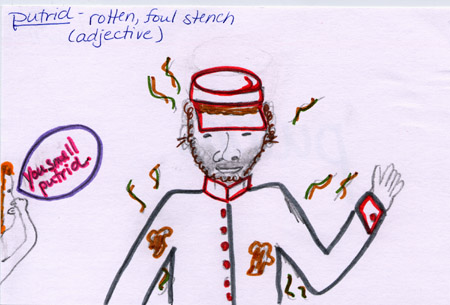
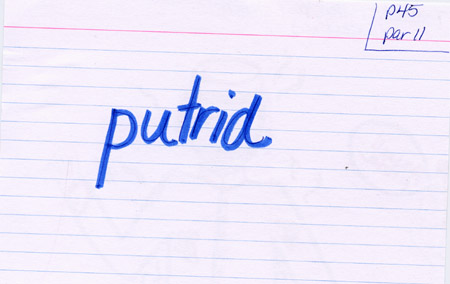
Fourth Grade (on grade level)
Section 2 (pages 24-50)
Discussion Director
The discussion director's job is to develop questions for the group
members to discuss about this section of the book. The focus is on
important ideas and issues in this section and designing questions that
address them.
1 Analysis
1 Inference
1 MCEOG
1 Cause/Effect
1 Setting
Analysis
1. Why would the women not want Big Boots to know that they understand
him?
(After seeing what Big Boots did to Soft Rain's arm when he demanded
her to translate to everyone, they probably thought it would put them in
danger, too, if Big Boots knew they could understand him.
At this point, after all that the white men have done to them, the
women probably do not even want to speak the white man's language.
They may not like being able to understand what such terrible and mean
people say (Page 44, paragraph 4)).
Inference
2. Why were the white men not sick if their diseases were making
the women and children sick?
(The white men had been exposed to their diseases all their lives,
so their bodies had built up an immunity to the diseases. They were
not sick because they did not have the diseases; they were carriers of
them. The women and children were very sick and even dying because
the diseases were new to their bodies. They had never been exposed
to the diseases before, so their bodies did not know how to fight them
(Page 48, paragraph 4)).
MCEOG
3. All of the following show what was being said silently, without
speaking or dialogue, except which one?
A. Soft Rain said it was okay to give the
Old man the bread.
B. The Old man asked if he could have the
bread.
C. Soft Rain offered the Old man some butter
for his bread.
D. Mother asked Soft Rain if it was okay with
her to give the bread to the Old man.
(C. Soft Rain offered the Old man some butter for his bread.
Page 40, paragraph 6)
Cause/Effect
4. Why does it seem strange to Soft Rain that the soldiers hit
each other on the back when they finish the second pen?
A. She thought they were friends.
B. The act of hitting usually signifies anger,
but the soldiers seemed very pleased with each other.
C. She had seen them doing the same thing
to their horses.
D. The act of hitting usually signifies happiness
and the soldiers were very angry with each other.
(B. The act of hitting usually signifies anger, but the soldiers
seemed very pleased with each other. Page 43, paragraph 2)
Passage Picker
The Passage Picker's job is to select significant passages from the
selections being read; determine why those passages are important; call
other group member's attention to the passage; and lead a discussion about
the passage.
Steps:
1. Pick
out a passage you would like to share.
2. Write
down the page and paragraph number.
3. Write
down the first two words and the last two words of your passage.
4. Write
down the reason you chose the passage, and explain why!
5. Ask
a question about your passage, and give an answer.
6. Write
down the Author's Purpose: To Describe, To Entertain, To Inform,
or To Persuade.
1. Passage One- Descriptive
2. Page 30, paragraph 7
3. "Wh-Where . . . Mother's bravery."
4. It describes Mother and Soft Rain in a subtle way. Mother
has never spoken to a soldier before and her English is not very good,
so she was very courageous when she asked where they were going.
The passage describes how proud Soft Rain was of her mother's bravery.
Soft Rain's pride shows her loving personality and how important her mother
is to her.
5. Soft Rain had talked to the soldiers before, so why did she
think her mother was brave for talking to them?
(Mother did not speak English very well and had never spoken to the
soldiers before. So, her first time doing so must have been a scary
event for her. And she asked them a question, which means she expected
them to answer her. That was dangerous because the white men probably
felt that they did not have to explain anything to the Cherokee people.)
6. Author's Purpose: To Describe
1. Passage Two- Informative
2. Page 50, paragraph 4
3. Aunt Kee . . . family now."
4. I chose this passage because it is effective. It shows
how much the Cherokee people lost and how quickly they lost it. This
us just one example, but you have to realize that the same thing was happening
to all of the people being forced to leave North Carolina.
5. What does Aunt Kee mean when she says that the soldiers have
taken her husband from her?
(Perhaps Uncle Swimming Bear was with Aunt Kee and Green Fern when
the soldiers came. The soldiers may have separated them and taken
Uncle Swimming Bear somewhere else. Or, maybe, the soldiers took
Green Fern and Aunt Kee when Uncle Swimming Bear was not home, like they
did with Soft Rain and Mother. Aunt Kee may have meant that they
were separated and she does not think she will see Uncle Swimming Bear
again.)
6. Author's Purpose: To Inform
1. Passage Three- Descriptive
2. Page 43, paragraph 1
3. "Soft Rain. . . and dry.
4. The things that Soft Rain and Mother do demonstrate how much
they love Hawk Boy and Father and how anxious they are to see them again.
Soft Rain looks for them every day when the new people come in. Mother
looks for them, too, and keeps Father's tobacco pouch safe and dry.
5. Do you think Father and Hawk Boy will be brought to the same
pen that Soft Rain and Mother are in? Why or why not?
(No, I think the place where Soft Rain and Mother are being kept is
mostly for women and children. If Father and Hawk Boy have been captured
by the white men, they have probably been taken to a place for men.
But maybe they have not been caught and they will rescue Mother, Soft Rain,
and the others.
6. Author's Purpose: To describe
Passage Four- Informative
Word Wizard
The Word Wizard's job is to search the section being read for words
that are key to understanding what is happening in the story; note the
page and sentence where it can be found; check the dictionary meaning of
the word; lead a discussion about the meaning and intent of the word from
context and what the word contributes to the importance of the passage.
Steps:
1. Write down the word.
2. Copy the sentence from the book in which
the word appears.
3. Look up the word in the dictionary.
4. Using the context clues from the sentence
and the dictionary definition, write in your own words the
definition of the word.
5. Write the correct part of speech (noun,
verb, adjective, or adverb).
6. Write a question and the answer about the
word that would help you teach the word to your group,
refer back to the text,
or write a sentence using the Word Wizard word.
7. Make your Word Wizard card. Be sure
to include in big print, your word and the page and paragraph
number. On the other
side of the card should be a picture, the word, and the definition of the
word.
1. Putrid, Page 45, paragraph 3
2. His smell- a more putrid stink than she had ever known- made her
grunt.
3-4. putrid- rotten, foul stench
5. adjective
6. A putrid smell was coming from Gray's lunch box because he
had left a tuna sandwich in it all weekend.
7.


1. Din, Page 35, paragraph 2
2. Over the din of the terrified crowd, no one heard Soft Rain
scream when she was pushed into the pen, clinging to Mother with one hand
and grasping Pet's rope with the other.
3-4. din- loud, confusing noise
5. noun
6. The teacher could not hear Alice's comment over the din of
the rest of the class.
7.
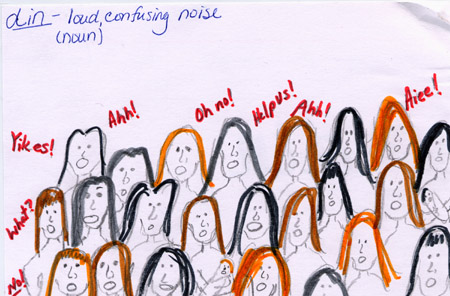
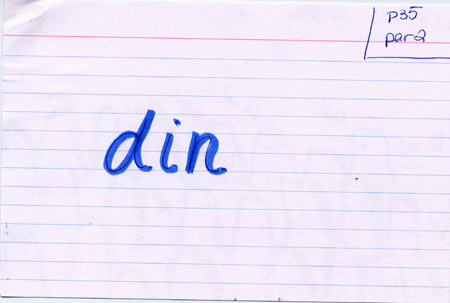
3. dawdling, Page 31, paragraph 1
4. persuaded, Page 47, paragraph 5
Character Sketcher
The Character Sketcher's job is to develop a character map of major
characters in the section of text being read.
Steps:
1. Pick out a character that interests you. Choose three
words to describe this character.
2. For each trait, you will give proof (an example) from the
book (write down page and paragraph).
3. Write out the character's goal, problem, and solution (page
and paragraph).
4. Last, you will draw a picture of your character.
Mother
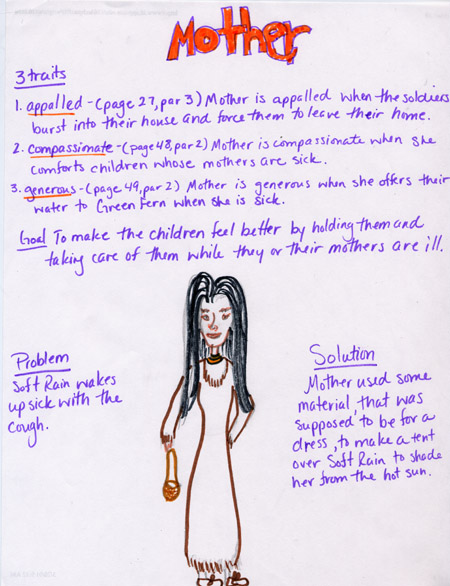
Artful Artist
The Artful Artist's job is to develop a creative way (illustrate a
scene and explain it in a short paragraph) to respond to the events and
themes in the story.
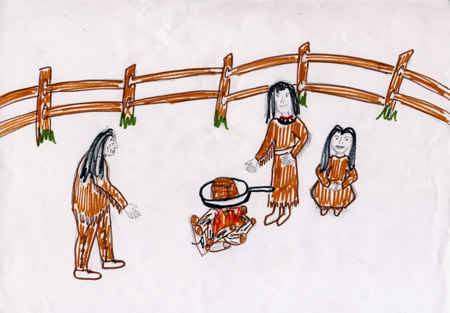
This picture is about Soft Rain and Mother giving the rest of their
bread to the Old man. This scene took place in one of the pens at
the stockade. They were kept caged up like animals. They could
not go to the river to bathe, and many were sick. This is taking
place the day after they arrived at the stockade. It was two days
after the night that the Green Corn Dance would have been celebrated.
I chose this scene because I thought it was a wonderful example of the
giving nature of Native Americans. They never killed or planted more
than they needed. They were not greedy people. So, when the
Old man stared hungrily at their bread, Mother and Soft Rain gave it to
him before he even asked for it. They had very little, but they still
gave willingly of what they had.